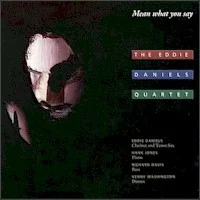Styles: Piano Jazz
Year: 1981
File: MP3@320K/s
Time: 48:19
Size: 112,1 MB
Art: Front
(4:09) 1. Mood Indigo
(4:27) 2. Sophisticated Lady
(5:01) 3. Jumpin' Punkins
(4:03) 4. Solitude
(4:20) 5. Lost In Meditation
(6:06) 6. Take The A Train
(4:24) 7. Blood Count
(5:17) 8. Lush Life
(3:48) 9. Isfanan
(4:02) 10. Lotus Blossom
(2:37) 11. Jimmy Rowles Statement
Year: 1981
File: MP3@320K/s
Time: 48:19
Size: 112,1 MB
Art: Front
(4:09) 1. Mood Indigo
(4:27) 2. Sophisticated Lady
(5:01) 3. Jumpin' Punkins
(4:03) 4. Solitude
(4:20) 5. Lost In Meditation
(6:06) 6. Take The A Train
(4:24) 7. Blood Count
(5:17) 8. Lush Life
(3:48) 9. Isfanan
(4:02) 10. Lotus Blossom
(2:37) 11. Jimmy Rowles Statement
Jazz critic Gary Giddins explored the game of Jimmy Rowles in his book Visions of Jazz: The First Century (1998); "His repertoire is immense and mysterious: original compositions, standards and curiosities, with mastery of the Wayne Shorter repertoire (not the Miles Davis pieces but the Blakeyperiod, such as" The Chess Players "," Running Brook "and "Lester Left Town" [1959/60]) and the Ellington, Strayhorn book. "Giddens notes that Rowles was one of the few who were concerned with their barely noticed compositions such as" Blood Count ", [3]"Black Butterfly", "Lost in Meditation" and "Lotus Blossom" grappled by the orchestral sound moods of the Duke Ellington Orchestra imitated on the piano . This employment culminated in 1980 - after albums such as Grandpaws (1976, with Buster Williams and Billy Hart ) and the solo album Ellington By Rowles (1979) in the album Jimmy Rowles Plays Ellington to Billy Strayhorn , in which he Ellington melodies , harmonies , voicings and solos . The first title of the album, " Mood Indigo " from 1931, is the only title in which Rowles presents "a demonstration of the melodic and harmonic mannerisms of the duke"; " Sophisticated Lady " starts in Rubato and continues at a slow and sweet pace. In "Jumpin 'Punkins" (1942) Rowles shows the boogiw-woogie influence in the rhythmic figures that accompany the theme . " Solitude " (1934) undergoes a warm-hearted reinterpretation; "Lost in Meditation" (1938) is played here deviating from the original in an attractive, swinging tempo.
Strayhorn's " Take the" A "Train " (1939) begins with a standard introduction and is then translated by Rowles in a dark, abstract first chorus , before paraphrasing the melody in the second chorus . Then Rowles uses the trumpet solo of Ray Nance 's original recording as a texture for the third chorus, alternating here and there. The fourth chorus, in turn, is Rowles' own "single-note drift" and contains allusions to the game of Ben Webster , who was mentor to the pianist. The penultimate chorus uses Rowles back to Ray Nance allusive single notes, before following a rather abstract ending. After "Blood Count", Strayhorn's last composition before his death in 1967, Rowles plays one of Strayhorn's best known titles, " Lush Life " (1938) in a more rhythmically accentuated playground than usual. "Isfahan," a title from the Far East Suite (1964-66), goes through several moods and swings into a sloping melodic phrase . The album ends with "Lotus Blossom" (1947), which was said to be Duke Ellington's favorite Strayhorn composition. In conclusion, Jimmy Rowles makes a 2½-minute statement in which he tells of the tremendous impression the Ellington Orchestra made on him when Ben Webster , Jimmy Blanton , Ray Nance, and Cootie Williams arrived in 1940 for the first time Tacoma could experience live after he had previously known their music only from their records:"One of the things that touched me the most was, in addition to the great arrangements and compositions, the way Ellington led into the next song: he never told his musicians the title, but he played a few lines on it Piano, and the guys knew instantly which piece they would tackle. That knocked me off the stool. Rowles goes on to say that for him, this orchestra was "love at first sight"; He had been profoundly influenced throughout his career by Ellington's orchestrations, arrangements, compositions and various soloists. https://de.wikipedia.org/wiki/Jimmy_Rowles_plays_Duke_Ellington_and_Billy_Strayhorn
Plays Duke Ellington And Billy Strayhorn




















